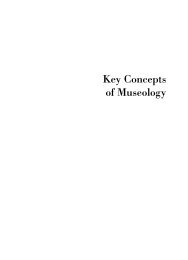ISS 25 (1995).pdf - The International Council of Museums
ISS 25 (1995).pdf - The International Council of Museums
ISS 25 (1995).pdf - The International Council of Museums
You also want an ePaper? Increase the reach of your titles
YUMPU automatically turns print PDFs into web optimized ePapers that Google loves.
And how would a program like this be shaped?<br />
By combining a conceptual framework with practical exercices , a program <strong>of</strong> studies for<br />
museum and community awareness is able to provide, at the same time, the fullfilling <strong>of</strong> rational<br />
aspects with the opportunity <strong>of</strong> emotional experiences and exchange. On the whole, it is<br />
important that trainers (whom we will call educators) create an atmosphere that enables those<br />
who follow the program to<br />
LEARN HOW TO LEARN<br />
that is, to understand how they are able to develop knowledge towards the world . <strong>The</strong> renowned<br />
brazilian educator Paulo Freire, in his book Pedagogy <strong>of</strong> Hope, reminds us that<br />
... To teach and to /eam are thus moments <strong>of</strong> a bigger process<br />
- that <strong>of</strong> knowing, which implies re-cognizing (re-cognoscere).<br />
(Paulo Freire, Pedagogy <strong>of</strong> Liberty, p. 47)<br />
Such process involves combined change: teaching and learning are on both sides.<br />
Programs on environmental education can be easily used for such purpose: they deal<br />
with a conceptual framework that involves the notions <strong>of</strong>: similarity/difference;<br />
adaptation/interaction; continuity and change; evolution; patterns. Through such notions, almost<br />
everything around us can be explained. One successful example is the program on Interaction<br />
museu-community through environmental education, developped at the University <strong>of</strong> Rio de<br />
Janeiro since 1991 and which has already generated a three year research on the matter, a 290<br />
hour transdisciplinary course and a book which preprint (I am proud to say) is already mentioned<br />
in Paulo Freire as an example <strong>of</strong> contemporary pedagogy.<br />
Community awareness programs may be organized by museums, universities and by<br />
communities themselves. In ali cases, it is important that they integrate ali such spheres <strong>of</strong><br />
action, enabling members <strong>of</strong> each community to create and care for their own museums, schools<br />
and universities - no more accepting imposed concepts, methodologies and models and being<br />
able to care for their own identities and heritage.<br />
175<br />
Tereza Scheiner<br />
Stavanger, Ju/y 3, <strong>1995</strong>.
















